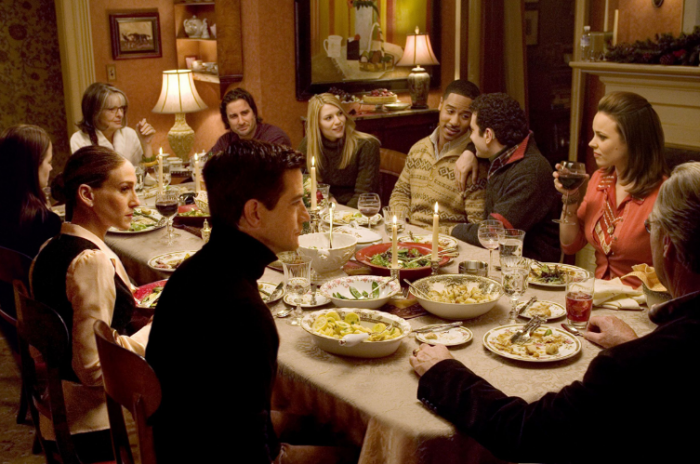The idea of the “Highly Sensitive Person” has gotten a lot of press this year.
In many ways, it’s like saying “sensitive skin”; it’s a catch-all term to explain how reactive you are. Everyone’s skin reacts when exposed to harsh chemicals or elements, but for some of us, the threshold at which we’ve had enough is pretty low.
Even when we know that we get easily overwhelmed, it’s easy to get sucked into the idea of how we are supposed to enjoy the holidays, instead of treating ourselves lovingly too. If this time of year is supposed to be focused on comfort and joy, it’s hard to do that if we are alternating between panic and exhaustion.
A few things I’ve found that help:
1. Forget “Should.”
You know, all those things that creep up that you don’t want to do, but have this lingering feeling that you “should” do them or the holiday police will come knocking on your door. Office party. Cookie swap. Holiday cards to everyone you’ve ever met.
If the idea of an activity immediately results in you holding your breath or a knot in your stomach, consider whether it’s something you can skip. I like to think of it this way: if I ate every treat that was offered to me during the holidays, I would feel ill most of the time, not to mention over-stuffed and uncomfortable. It’s the same way for many of us with social engagements. Choose the ones you love the best, the ones that make the holidays feel special to you.
And on that note…
2. Learn how to say “no” graciously and without making excuses.
I used to feel like I needed to have some sort of excuse if I was going to say no to something. It turns out, you don’t. Most of the time if you simply tell people, “Sorry, I’m can’t make it,” that’s sufficient. And if someone asks, be honest, straightforward and honor your boundaries. We wouldn’t allow others to have the final say about our financial budgets, and the same should be true of our time and energy budgets. For those of us who tend toward introversion, social time can be depleting rather than energizing. Be honest with yourself about how much you have available to “spend,” and stick to it.
3. Keep a close eye on your caffeine, sugar and alcohol intake.
Okay, I know asking most people to skip caffeine, sugar and alcohol completely during the holidays will get a big eye roll and many readers skipping to the next item on the list. A big part of our holiday celebrating includes this stuff, so instead of trying to skip all of it or eat all of it and deal with the consequences later, it helps if we can be intentional about it. All three of these can contribute to feelings of anxiety, or exacerbate anxiety if it’s already an issue. If you must have a holiday-themed latte when you meet a friend to hang out in the morning, have water or tea in the afternoon instead of another coffee while you’re out shopping.
If you know you want to have a martini at a party on Saturday, skip the wine at dinner Friday night. You get the idea. Enjoying these parts of the holidays can be wonderfully fun, or they can leave us feeling edgy, itchy and in a perpetual state of anxiety hangover if we overdo it. Pick the ones you love and skip the rest.
4. Make time for silence every single day.
Really, this is helpful all year, but especially during the holidays. Taking five to 10 minutes to sit somewhere in silence is a huge help for both our bodies and our minds when much of this season is incredibly loud and crowded. You can use the time to meditate, or simply to sit with your thoughts. I like to try and squeeze in extra burst of silent time here and there too: when I’m driving, in the shower, while making coffee in the morning… We are often so quick to fill the space in our day and then we wonder why we feel exhausted at the end of it. When you have the option, leave some aural space and enjoy the silence.
5. Play with essential oils and natural scents.
There are so many artificially-scented things everywhere you go this time of year. Whether you have allergies or are just sensitive in general, they can end up feeling like an assault after a while. Still, the right scents can make us feel more relaxed, joyful, peaceful and generally in a holiday mood.
Ginger and sweet orange essential oils diffused together smell like Christmas to me, and both oils are good mood boosters. Frankincense and rose essential oils in the bath are relaxing and wonderful for your skin. Half a lemon and some rosemary or mulling spices in a small pot of water on the stove top make the whole house smell delicious without a barrage of chemicals. If used effectively, scent can help us feel calmer instead of being the last straw in a long line of things that overwhelm.
6. Breathe.
The pace of the holiday season can feel frenetic, even if you aren’t highly sensitive. When I notice physical sensations of anxiety in response to the demands, the crowds, the noise, etc., I stop and remind myself that I have complete control over the pace of my breath. December in America is going to continue to be a busy, crowded, frenzied time, but we do not have to raise our internal pace to match it. The fastest way to restore our internal rhythms is to adjust the pace of our breathing.
7. Hydrate.
The idea of “enough” water varies widely, but the dry heat indoors and the frigid dry air outdoors definitely depletes us. When I find that I’m starting to feel overwhelmed, after paying attention to my breath, the next thing I do is add water. Julie Bernier’s piece on the Ayurvedic perspective on drinking water is full of the specifics on how often, how much and what temperature water will help us feel our best.
8. Find a physical practice to ground and restore you.
For me, it’s Yin yoga. As much as I love the rhythm of my Ashtanga practice, Yin (and especially heated Yin this time of year) grounds me and makes me be still—inside and out—in a totally different way. Whether it means finding the type of yoga that fits for you, or simply making time for a quiet walk, taking time to pay attention to what your body needs in response to a busy time is important.
9. Go to bed.
Really. Not lay in bed messaging friends on Facebook on your iPhone and reading skincare articles. (Because of course, I never ever do that…) So many experts recommend unplugging hours before bedtime, and for many of us, that feels totally unreasonable. What I have found that helps is letting unplugged time creep in more and more—instead of the reverse. Wednesday nights, I unplug super early, and it feels so good that it makes it easier to want to unplug a little earlier other nights too. Making bedtime a ritual instead of an exhausted collapse goes a long way towards having a great morning the next day.
10. End the day with gratitude.
For those of us who tend towards being sensitive or having anxiety, it’s easy for the last moments before sleep to be a never ending stream of “to dos”, “what ifs”, and “shoulds.” When I catch myself doing this, I interrupt that train of thought, physically change my position in the bed, take a sip of water and a deep breath. Then, when I lie back down, I begin to think of people and things I’m thankful for. There will always be things to worry about. They will still be there when we get up in the morning, so all the better to get a good night’s sleep so we can deal with them head on when we get up.
The highlight reel of Facebook and Instagram can quickly make us feel like we aren’t doing something right if this time of year makes us anxious instead of elated. Taking time for self care isn’t selfish; it’s essential if we want to enjoy the holidays and be able to give the people we love the gift they want the most: our presence.
Love elephant and want to go steady?
Sign up for our (curated) daily and weekly newsletters!
Author: Kate Bartolotta
Editor: Renée Picard
Photo: Sunlight Cardigan at Flickr



Read 5 comments and reply